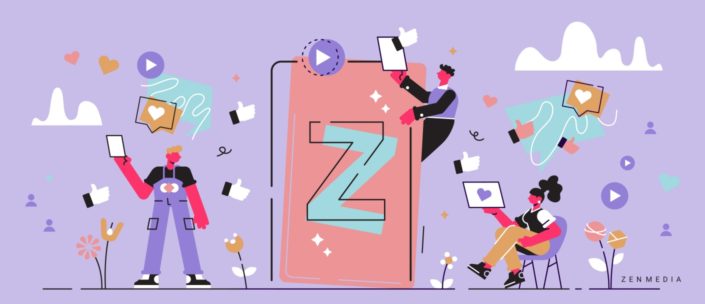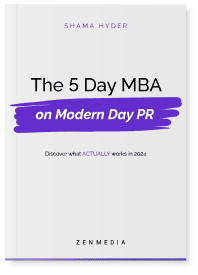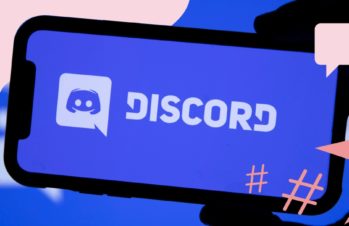Do you know what makes Gen Z tick? Chances are, if you’re a B2B marketer or business leader, you don’t know this up-and-coming generation as well as you should—yet.
While most buyers and decision-makers in B2B are Millenials (at 60%) and Gen X (at 32%), Gen Z shouldn’t be overlooked. In fact, while only 2% of B2B buyers are Gen Z, that number is expected to rise rapidly over the next decade—and Gen Z’s impact isn’t just in their own buying power, it’s also in how they affect the overall population.
Just like Baby Boomers migrated onto Facebook, following Millennials’ lead in the early 2000s, Millennials are following Gen Z’s lead when it comes to new social media platforms today—hello, TikTok—and as social media behaviors become more tied to purchase behaviors due to the advent of dark social and online shopping, the behaviors we see in Gen Z will also be present, to some degree, in our core B2B buyer base.
Related reading: 5 Tips to Hacking the Tiktok Algorithm
These 90s and early aughts babies are already making waves and will dominate the market in the coming years. So how do you market to them? What do they want from businesses?
As young adults become more engaged in purchasing, businesses struggle to keep up with their evolving preferences. Generation Z, or Zoomers, are digital natives who grew up with laptops in their cribs (maybe not literally, but you know… close to it) and smartphones in their hands, so it’s no surprise that they have different expectations for how they want to be communicated with and marketed to.
As this generation steadily makes its way into the workforce and begins taking on leadership and decision-making roles, companies must adapt their strategies to appeal to Gen Z.
Who is Gen Z, and what do they want from your business?
Generation Z is quickly becoming the largest powerhouse in the consumer market and already represents up to $143 billion in buying power. They are on track to becoming the most significant consumer compared to older generations.
Gen Z begins with those born between 1995 and 1997—though the more qualitative “Do they remember 9/11?” question is the psychographical test that some use to determine Millenial vs. Gen Z status. If someone in the 1995 to 1997 birth year range remembers 9/11, they are considered Millennial. Whereas, if they don’t, they fall into Gen Z. Typically, the Gen Z range ends with those born in 2015.
So while Gen Z is certainly still coming of age—many are still backpacking through elementary school—there are many who are already climbing corporate ladders, with the older end of the generation already hitting their late twenties at 27.
Regardless of whether they are grade-schoolers or college grads, Zoomers are tech-savvy, having been raised on a diet of technology and instant access to information. They are the epitome of the informed buyer because they have never lived in a time where researching and comparing products wasn’t as easy as a quick Google search. They do a lot of research before purchasing a product and are considered one of the more pragmatic generations.
But in spite of their technology dependence and analytical and research-focused nature, Gen Z cares deeply about relationships and authenticity. They care about the brands they buy from and often stay loyal to those brands for years to come. This is especially true if they feel connected to the values the brand touts. For instance, brands that advertise their inclusivity and commitment to ethical practices—i.e., brands that care about DEI and CSR—are more likely to capture and keep the attention and loyalty of Gen Z buyers.
Related reading: Diversity, Inclusion & Equity: Key Differences & Why They All Matter
On the flip side, companies that Gen Z view as unethical, inauthentic, or uninclusive will struggle to get any traction with this generation. In other words, these kids should not be messed with when it comes to spending their hard-earned cash. They don’t trust companies as easily as other generations and have marked skeptical outlooks when it comes to marketing, B2B PR, and advertising.
So what else is there to know about this rising force of young consumers? Read on.
Related Reading: Gen Zs or Millennials? How to Uncover Your Target Audience
What makes this generation different from others?
Gen Z grew up with constant access to the internet through an ever-growing number of devices. They are used to being able to find whatever they want, whenever they want it. As a result, traditional marketing tactics often feel too slow or impersonal. Instead, Gen Z is big on social media, videos, and influencer marketing. They want brands to communicate with them on their terms and in their language. They also expect a high level of personalization.
While email is still the number one way to reach older generations, Gen Z craves something new—63% of Zoomers are partial to social media marketing, while only 56% said they prefer email. So, to reach Gen Z, you need to be active on social media and ensure your brand has a good reputation while balancing the “old” tactics like email marketing.
The good news is that many of the tactics you’ve developed for marketing to Millenials will also work for Gen Z. As the two generations continue developing their professional preferences, they are being heavily impacted by one another, with Gen Z following in the footsteps of their predecessors, and Millennials keeping tabs on what the up-and-comers are bringing to the table.
But the most significant emphasis Gen Z has is on authenticity. While most of the Gen Z purchasing habits research is centered on B2C, we can presume that some of those preferences will also flow into the B2B space. This means that Gen Z will spot half-hearted attempts to connect a mile away. As they come into their own, filling more B2B buyer roles, they may even be researching companies in ways many haven’t before. For example, we could see Gen Z looking at GlassDoor to see how a company treats its employees before deciding to do business with them. This level of research + high ethical standards will change the “it’s not personal, it’s business” mindset that has been prevalent for generations prior.
Here are some tips for using these tactics to influence Gen Z.
Marketing Tactics to Influence Gen Z
Create visually engaging content.
Beautiful, compelling visual B2B content is vital. The first impression you make should be one they will never forget or get tired of looking at!
People scrolling through their social media feeds are more likely to stop and read an article if it is paired with high-quality photos. For this social-media-focused generation, the same will prove true. Brands need to bring more visual intrigue to the table and make sure that their design and graphic game is on point to attract Gen Z buyers.
Make easy-to-consume videos.
When asked about their favorite social media platforms, 81% of Gen Z said Instagram and YouTube. Gen Z is highly engaged on video platforms (hellooo, TikTok), so by creating content native to the platform, you are more likely to reach them where they spend most of their time.
Related reading: How the Instagram Algorithm Works in 2022 (+ 7 Algorithm Hacks)
Keep things witty and playful in video content—this generation appreciates humor. Use trending music and pop culture references to grab their attention, and don’t be afraid to experiment with creative visuals and editing effects. After all, Gen Zers are known for their sense of experimentation and their ability to embrace change.
So get creative and start producing some engaging video content! If you need some inspiration, check out some of the best Instagram Reels from brands like Nike, Adidas, and Levi’s.
Encourage conversation.
To market to this elusive demographic, you must encourage conversation—in your social media posts, in your communities (private groups or Discord chats), and anywhere else that Gen Zers communicate. But using a “let us know what you think” CTA may not reap the results you are looking for. Testing snappier, funnier, or more direct CTAs will show you how your audience likes to be communicated with. After all, nothing says “swipe right” like a clever comment or a witty retort.
So go ahead and start a conversation. You might make a sale. But more importantly, you’ll begin to build a community and rapport with your prospects. With Gen Z’s noted mistrust of brands, this is crucial.
Twitter and Instagram polls are interactive and easy ways to stir up some conversation in your posts. But don’t be too discouraged if you don’t see massive engagement right away. A lot happens on dark social, too—and it can’t happen without you creating content and fostering conversation in the first place.
Personalize your marketing campaigns.
87% of Gen Z says they want personalization from their favorite brands. This desire for a more personal touch likely comes from the fact that Gen Z grew up in a world that was already heavily digitized. As a result, they are used to seeing personalized ads and messages across all of their devices. And since they are always connected, they also expect brands to be.
How can B2Bs meet Gen Z’s expectations?
Businesses have long been trying to stay ahead of the curve when marketing to different generations. But as each new generation ages, companies are often left scrambling to keep up. Generation Z is no exception, so let’s discuss how you can meet some of their expectations.
Provide top-notch customer service.
To keep Gen Z consumers happy, you need to be available 24/7 and be able to meet their needs in real-time. That means being responsive on social media, offering live chat options on your website, and providing fast shipping options (we’ve all been spoiled by two-day shipping at this point). You also need to be transparent, keeping them informed of each step in the process, whether that means shipping information or it’s explaining a complex onboarding process to your services platform.
You’ll win over Gen Z and build lifelong loyalty by building an authentic relationship—and that is largely dependent on delivering exceptional customer service. So don’t underestimate the power of an excellent customer service team when marketing to this notoriously tough group.
Re-evaluate your brand’s values and inclusivity efforts.
Generation Z is the most diverse generation yet, and they’re not afraid to celebrate it. They are constantly pushing boundaries and demanding more from the world around them. When it comes to B2B marketing, brands need to be careful about the messages they’re sending. Gen Zers are quick to call out companies that don’t align with their values and are not shy about using their spending power to make a statement.
This generation cares deeply about inclusivity and celebrating differences, so brands should assess whether their marketing reflects those values. If your brand spouts any sort of exclusionary message or is tied to unethical business practices, you’re selling power with this generation will be seriously stunted. Whether it’s diverse casting in ads, strong corporate social responsibility initiatives, or using inclusive language—Gen Zers are paying attention and will reward the brands that get it right.
If you want to learn more about how to reach Gen Z, reach out. We’re happy to chat and help your B2B marketing connect with this important demographic.







